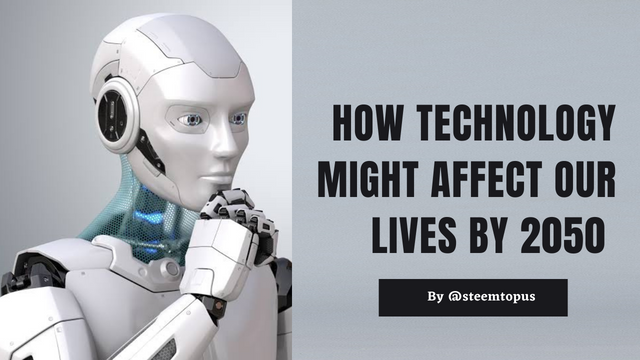How technology might affect our lifes by 2050 by @steemtopus

The technological advances we’ve seen so far have been fantastic, but they’re really just the tip of the iceberg when it comes to what’s possible with technology in the future. Technology is constantly evolving, and by 2050 that evolution will make all kinds of incredible things possible. The world will look very different from how it does today, and we’ll be able to do many things in entirely new ways thanks to advances in technology by 2050. Let's take a look at some of these predictions.
Smartphones
In just a few short years, our phones have become an extension of ourselves. We use them to check in at airports, hail cabs and make hotel reservations. In fact, most of us never leave home without one. By 2030, these miniature computers will be capable of everything from reading thoughts to detecting oncoming traffic—and they'll be practically indispensable to humans all over the world. The better your phone gets at recognizing your voice, envisioning what you see or hearing what you're thinking, for example, the smarter it'll get about anticipating your needs and providing services accordingly. That's not only convenient—it also might save time and money when time is precious and money is tight.
Connected cars
We’re already beginning to see technology change how we interact with cars. The 2017 Mercedes S-Class, for example, can not only park itself but also read road signs and adjust its speed accordingly. As cars become smarter, they’ll become more integrated into our lives—and driving itself will be safer and easier than ever before. Rather than being glued to their phones or worrying about traffic conditions, drivers of connected cars could potentially just sit back and enjoy the ride. And we’ll still have time to send a quick text or email on our way to work!
.jpeg)
Virtual reality
According to a recent Nielsen study, people all over the world spend an average of two hours per day looking at some sort of screen. It’s no surprise then that virtual reality (VR) is quickly becoming a big hit in many areas. VR is expected to become widely used within consumer markets by 2019 and has already been used in health care and gaming, among other applications. In addition, it’s possible that VR could also change education dramatically, helping students learn about different subjects and giving them an immersive experience with historical places and figures. Virtual reality is exciting for companies who hope to use it for advertising as well; because users can interact with VR in a 3D environment, companies can create environments that are more complex than those on television or in print advertisements. The technology is still new and being perfected, but there’s no doubt that VR will be a major player in how we live by 2050.
.jpeg)
Autonomous technology
When most people think of autonomous technology, they immediately picture driverless cars and trucks. While there’s a great deal of potential in that space, autonomous vehicles are just one small piece of a much larger ecosystem – one that includes everything from buildings to factories to robots. When it comes to autonomous technology, we have an idea of what’s possible (as well as what isn’t), but it remains difficult to predict how each individual application will influence our lives. For example, imagine walking into your office building and having no security guard check you in. Instead, face recognition technology identifies you instantly and tracks your movements throughout the day; it also knows where you want to go and which elevator you should take before even you do.
A.I. (Artificial Intelligence)
Artificial intelligence (AI) is really a blanket term for a bunch of related technologies, and it's hard to pin down an exact definition. But as Robert Schalkwyk, CEO of AiLive says, At its most basic level, AI is any technology that has been programmed to do something that normally requires human intelligence. In other words, AI is really about software solving problems in new ways or ways humans can't solve on their own. We're still very much in an early phase when it comes to AI—think 1980s-level stuff—but if you think back to video games from 30 years ago compared with what we have today, it's easy to imagine how incredible things could be in 20–30 years.
Brain-Computer Interfaces (BCIs)
When it comes to human-machine interfaces, brain-computer interfaces (BCIs) are currently some of the most advanced and promising. BCIs monitor your brain activity to read your thoughts and respond accordingly. For example, a computer might translate neural impulses into text so you can quickly type with your mind; similarly, you could use it to move an exoskeleton or prosthetic limb as if it were part of your body. The technology is currently in its early stages, but researchers are making steady progress toward widespread implementation—and for good reason: even though there’s much more work left to do, BCIs hold a lot of promise for those with disabilities and would allow us to control everyday devices without ever touching them.
.jpeg)
Smart cities
By 2050, more than 50 percent of us will live in cities and that number is only set to rise. As more people crowd into urban environments, we'll start to see cities evolve from information-rich networks of technology and electricity into smart hubs that leverage Internet of Things (IoT) technology and communication tools. For example, use cases for IoT could include smart lighting systems that reduce energy costs and traffic lights that adapt automatically to traffic conditions or weather conditions. People might not even need to own a car as ride-sharing becomes more popular or your apartment building could pay for groceries at local stores based on how many times you enter/exit it each week.
.jpeg)
Conclusions
The world in 2050 will be quite different from the world we live in today—and not just because of technological developments, although those will certainly shape our lives significantly.
30% beneficiaries to @hive-138339
Thank you @hive-138339 for the opportunity of this contest. I invite @gormogon and @atoa to this contest. Please participate if you can.


.jpeg)
.jpeg)
.jpeg)
Thank you for sharing such an interesting content with us. Stay active – write posts, comment, interact with others and enjoy .
JOIN WITH US ON DISCORD SERVER:
Thank you for sharing with us so much important information about technology.